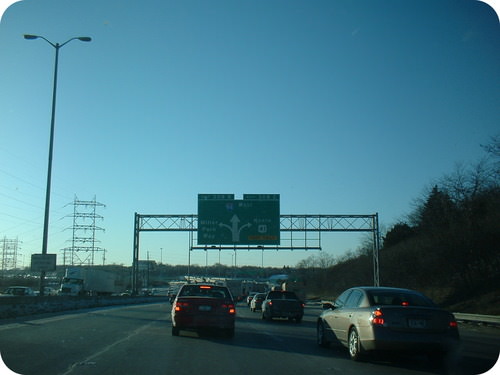18.6 影响反应率的因素
章节大纲
-
What are the chances of a fender-bender on the highway?
::在高速公路上搭挡工的几率有多大?Driving on a crowded freeway can get exciting. Lots of cars, drivers who aren’t paying attention, people who speed, people who drive too slow – the chances of a collision are rather high. A lot of cars in a particular amount of space equals a high car and many opportunities for unwanted connections with other cars.
::在拥挤的高速公路上驾车会变得令人兴奋。 许多汽车、没有关注的司机、超速驾驶员、开得太慢的人 — — 碰撞的可能性相当高。 在一个特定空间里,许多汽车都相当于一辆高车和许多与其他汽车不必要的连接的机会。Factors Affecting Reaction Rates
::影响反应率的因素By their nature, some reactions occur very quickly, while others are very slow. However, certain changes in the reacting conditions can have an effect on the rate of a given . can be utilized to explain these rate effects.
::就其性质而言,有些反应很快发生,而另一些反应非常缓慢,然而,反应条件的某些变化可能会对特定比率产生影响.可以用来解释这些比率效果。Concentration
::浓度浓度An increase in the concentration of one or more reacting substances results in an increase in the rate of reaction. When more particles are present in a given amount of space, a greater number of collisions will naturally occur between those particles. Since the rate of a reaction is dependent on the number of collisions occurring between reactants , the rate increases as the concentration increases.
::一种或多种反应物质的浓度增加导致反应率上升。当某一空间中存在更多的粒子时,这些粒子之间自然会发生更多的碰撞。由于反应率取决于反应体之间发生的碰撞次数,随着浓度的增加,反应率会上升。Pressure
::压力压力压力When the pressure of a is increased its particles are forced closer together, decreasing in the process the amount of empty space between the particles. Therefore, an increase in the pressure of a gas is also an increase in the concentration of the gas. For gaseous reactions, an increase in pressure increases the rate of reaction for the same reasons as described for an increase in concentration. Higher leads to a greater number of collisions between reacting particles.
::当一个粒子的压力增加时,它的粒子被迫更紧密地结合在一起,在过程中减少颗粒之间的空空空间。因此,气体压力的增加也是气体浓度的增加。对于气体反应来说,压力的增加增加了反应速度,原因与所描述的浓度增加的原因相同。增加导致反应粒子之间的碰撞次数增加。Surface Area
::地表地区A large log placed in a fire will burn relatively slowly. If the same mass of wood were added to the fire in the form of small twigs, they would burn much more quickly. This is because the twigs provide a greater surface area than the log does. An increase in the surface area of a reactant increases the rate of a reaction. Surface area is larger when a given amount of a solid is present as smaller particles. A powdered reactant has a greater surface area than the same reactant as a solid chunk. In order to increase the surface area of a substance, it may be ground into smaller particles or dissolved into a . In solution, the dissolved particles are separated from each other and will react more quickly with other reactants.
::放置在火焰中的大原木将相对缓慢地燃烧。 如果在火焰中以小树枝的形式添加同样数量的木柴, 则其燃烧速度会更快。 这是因为树枝提供了比原木更大的表面积。 反应器的表面积增加会提高反应速度。 当一定数量的固体作为小粒子出现时, 表面面积会更大。 粉末反应器的表面积比固体块的反应器要大。 为了增加物质的表面积, 它可能变成小粒子或溶解成一个。 在溶液中, 溶解的粒子会相互分离, 并与其他反应器反应得更快 。Temperature
::温度Raising the temperature of a chemical reaction usually results in a higher rate of reaction. When the reactant particles are heated, they move faster and faster. This results in a greater frequency of collisions. A more important effect of the temperature increase is that the collisions occur with a greater force and are thus more likely to surmount the barrier and go on to form products. Increasing the temperature of a reaction increases the number of effective collisions between reacting particles, so the increases.
::提高化学反应的温度通常会产生更高的反应率。当反应粒子变暖时,它们会更快地移动。这导致碰撞频率的提高。温度升高的一个更重要的影响是碰撞的发生力更大,因此更有可能越过屏障,进而形成产品。 反应的温度提高会增加反应粒子之间有效碰撞的次数,从而增加碰撞次数。Summary
::摘要-
Factors affecting reaction rate are:
-
concentration of reactants
::反应器集中度 -
pressure (if gas)
::压力(如果气体) -
surface area
::平面面积 -
temperature
::温度温度
::影响反应率的因素是:反应力压力(如果气体)浓度表面积温度 -
concentration of reactants
Review
::回顾-
How does an increase in concentration of reactant increase the reaction rate?
::反应器集中程度的提高如何提高反应率? -
Why would rates increase with a larger surface area of reactants?
::反应器的面积较大,为什么费率会增加? -
What effect does temperature have on reaction rate?
::温度对反应率有什么影响?
Explore More
::探索更多Use the resource below to answer the questions that follow.
::利用以下资源回答以下问题。-
What factor was demonstrated by adding oxygen to the fire?
::在火焰中添加氧气表明了什么因素? -
What was shown with the aluminum powder?
::铝粉是用什么显示的? -
What factor was mentioned, but not demonstrated?
::提到哪些因素,但没有说明?
-
Factors affecting reaction rate are:
